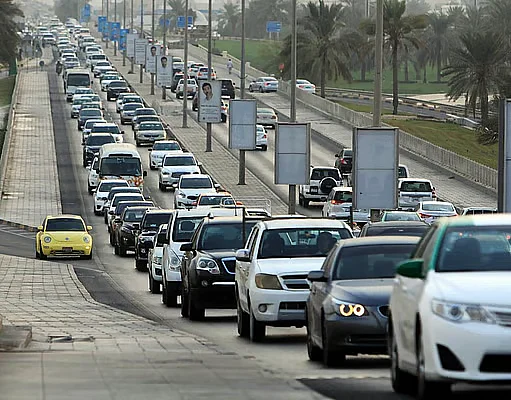
UAE Motorists Who Lose Up To 4 Hours In Traffic Daily Welcome New Highway Announcement
Every morning before sunrise, Mohyeddin Yousef begins a journey that takes him across three emirates. The 29-year-old Lebanese high-school math teacher lives in Ajman, drops his children off at school in Sharjah, and then continues to Dubai for work.
“On normal days, it's about an hour and a half, but if there's an accident, it can stretch to two hours,” he said.“That means I spend three to four hours in traffic every single day.”
Recommended For YouMohyeddin is part of a growing number of commuters navigating heavy morning and evening traffic between the northern emirates and Dubai. According to the Ministry of Energy and Infrastructure, vehicle ownership in the UAE has been increasing by more than eight per cent annually - four times the global average of about two per cent - as the country's population and economic activity expand.
Stay up to date with the latest news. Follow KT on WhatsApp Channels.
Officials say overlapping school and work hour s have also intensified peak-time congestion across federal and local roads.
Over the years, Mohyeddin has experienced three road accidents, including one on the Dubai–Sharjah highway that he recalls vividly.“I've seen everything - twisted metal, fires, injuries, even deaths,” he said.“By the time I get to work, I'm already drained.”
The long commute has reshaped his family routine.“When I get home, I'm too tired to play with my kids,” he said.“I usually sleep right after sunset just to recover, and by the time I wake up, my family is already asleep. I only really see them on weekends.”
For residents like Mohyeddin, the government's new Dh170-billion plan to develop transport infrastructure - including a fourth national highway connecting the northern emirates to Abu Dhabi - offers hope of shorter, safer journeys. The project will support smoother movement of people and goods while easing pressure on existing corridors such as the E11.
He, however, called for a study of where people live and work.“Technology could help with that - maybe an app that maps commuting patterns.” He believes improving public transport and addressing housing prices could offer more sustainable solutions.“If metro access were expanded, more people would use it,” he said.“Public transport would cost less and deliver faster results.”
Stronger rulesRashid Saif Al Bedwawi, 54, from Dubai, said congestion has become a major obstacle to productivity.“We lose hours on the road every day,” he said.“It delays meetings, appointments, and business opportunities.”
He praised the UAE's continued investment in modernising its transport network and called for complementary efforts to improve driver behaviour and vehicle safety.“The issue isn't just the roads,” he said.“It's also about driver awareness. Some old cars are still on the roads despite being unsafe, and many drivers don't follow basic rules of safe driving.”
Rashid said stronger vehicle inspections, stricter enforcement, and public awareness campaigns could further enhance road safety and help the UAE meet its goal of reducing congestion and accidents nationwide.
'Stress and discomfort'Sharjah resident Jamila Ahmed, who commutes daily to Dubai for work, echoed similar concerns.“The journey, which should ideally be short, now consistently takes over an hour each way due to the intense traffic, turning a simple drive into a lengthy and tiring ordeal,” she said.
She described the constant gridlock and slow-moving traffic during peak hours as“stressful and unpredictable,” noting that the time lost on the road has deeply affected her daily life.“Spending so much time in traffic causes a great deal of stress and physical discomfort. It starts my day on a negative note and leaves me drained by the time I get home. As a mom, I don't have much time left to spend with my children,” she said.
Jamila said she is hopeful about the government's new transport plan.“It shows a clear commitment to addressing the traffic problem, and it's a necessary step to manage the growing number of vehicles on the road,” she said.“A shorter, less stressful drive would mean more personal time, reduced daily anxiety, and a much better work-life balance.”
She added that employers can also play a role in easing commuter stress.“I hope companies will adopt more flexible options such as reduced working hours or remote work,” she said.“That would help just as much as new roads in improving people's quality of life.”

Legal Disclaimer:
MENAFN provides the
information “as is” without warranty of any kind. We do not accept
any responsibility or liability for the accuracy, content, images,
videos, licenses, completeness, legality, or reliability of the information
contained in this article. If you have any complaints or copyright
issues related to this article, kindly contact the provider above.

















Comments
No comment